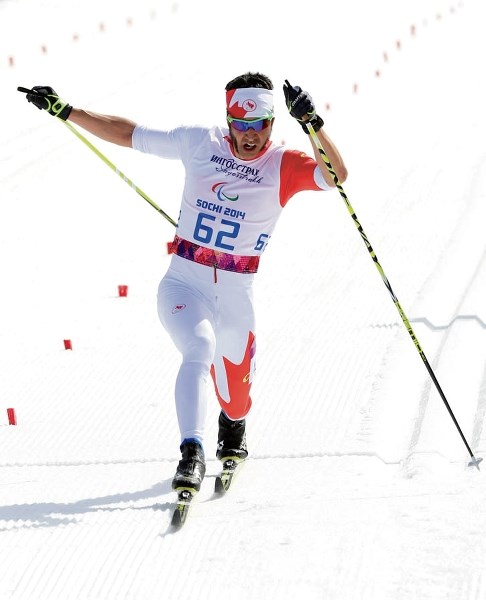Canmore’s Brian McKeever proved there’s more than one way to crack a golden goose egg.
Battling a virus he and half of the ParaNordic team picked up in Italy, McKeever still managed to capture the 11th Paralympic medal of his career with a gold-medal performance in the visually impaired 20-kilometre classic ski race at the 2014 Paralympics in Sochi, Russia.
The win was Canada’s first of the games and the start of what’s expected be a dominant performance by the Canmore native.
Erik Carleton and Graham Nishikawa split guiding duties in order to keep an incredibly high speed over the 20-km course, while McKeever, 34, used his patented perfect pacing to crush the competition with a time of 52:37.1, more than a minute ahead of Stanislav Choklaev of Russia. It was the same race strategy that saw McKeever defeat Graeme Killick in one of two Olympic trial distance races in January.
Taking advantage of a rock-hard salted course, Chocklaev, 24, blasted out of the gates and held a 25-second lead on the field by the eight-kilometre mark. McKeever and Carleton chose a more conservative pace. The Canadians had barely skied since arriving in Sochi due to the virus, and were unsure how their bodies would respond to race pace.
But once they knew their fitness was there, they kicked up the intensity and began eating away at the lead. Carleton guided McKeever with an excellent pace, and by the time Nishikawa took over guiding duties, the hot sun had softened the course and the Canadians were in first place.
“When the course changed, (the Russians) were still strong, but getting wet. We still had power to go. At one point, the cord snapped and our lead went from two seconds to 30 seconds,” McKeever said.
In the final six kilometres, McKeever pushed hard to extend that lead to 1:06 ahead of Chocklaev and four minutes ahead of Zebastian Modin of Sweden, who grabbed the bronze medal. In the last 20 metres, Nishikawa peeled off to allow McKeever to cross the finish line by himself.
McKeever in turn credited his guides for calling a perfect race, as splitting their duties proved to be the right call. A fast guide allows McKeever to conserve energy, as he’s able to duck behind them on the downhills and push on the climbs, so supplying him a new guide halfway through the race provides a boost.
“It’s the first time we’ve done it,” McKeever said. “It worked well, especially (Monday) when it was so much faster to sit behind. It also helped that my skis were extremely fast. There were places where I was resting and my guide was double poling hard,” McKeever said.
“It was a convoluted plan and a risky plan that needed to be done only because of the strength of the athlete,” said head coach Robin McKeever, Brian’s older brother and former guide. “Guiding in these conditions is brutal, and when you are leading a world class athlete like Brian it is very difficult to keep the pace he needs.”
Carleton has been McKeever’s guide since 2011, and the team brought in Nishikawa this year to support the training group. Together, they form one of Canada’s top training groups and all three were in contention for inclusion on Canada’s Winter Olympic team.
With so many variables, McKeever was happy to see the team come through.
“I’m super happy, especially with how the week has been going,” McKeever said. “Everybody got sick. We caught a virus in Italy and we couldn’t ski for a week. It was bad timing, but it could have been worse,” he said.
Chris Klebl, coach Robin McKeever, one of the team’s wax techs, Carleton and Brian all caught the virus, but hope to feel better by the end of the week.
McKeever suffers from Stargardt Disease, a genetic macular degeneration condition that gradually robs him of his eyesight. McKeever has peripheral vision, but likens his condition to staring through a straw. There is no cure for the disease, however gene therapy clinical trials and stem cell clinical trials are under way and showing promising results, according to blindness.org.




